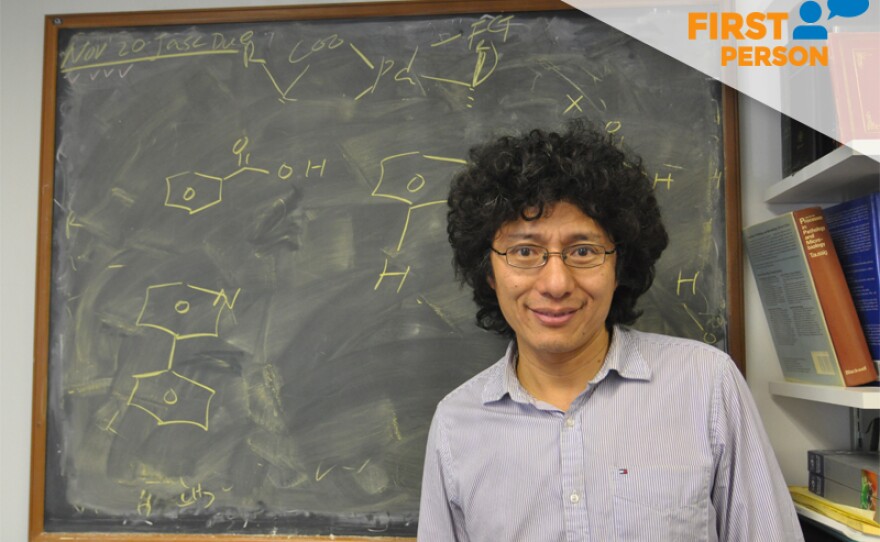Last month the MacArthur foundation honored nearly 2 dozen scientists, artists and thinkers with their annual genius grants. One of this year's geniuses is Jin Quan Yu . A chemist at Scripps Research Institute. He works on breaking down the very strong connections between carbon and hydrogen eight Ems known as tran eight. His research could help me new drugs more quickly and without as much waste. As part of our first-person series, he told his story. My name is Jin Quan Yu. I'm a professor at Scripps Research Institute. We study how to break a very strong bond, called eight C-H bonds , we break them and more importantly replace them. We invent reactions that aren't in the text video. These reactions will transform the way and how we think about making molecules and that can be medicine, perfume or Hydro chemicals. I grew up in a very small village. My family house was isolated. We grew everything ourselves, we even made our own shoes. What I grew up with, was nature. I spent most of my time in the mountain playing with fish. When I had eight years old, my parents pushed me to travel far for school. I had to climb the mountain and walked down and then walk out for two miles and then I had to cross a river in a boat. My mother insisted it was only five miles, to me it was like a marathon every day. When I got there, I would always miss the first class. I would have to head back quickly, before it would get dark. I always missed the final class. We only had one room and the five classes sat in the same room. I would listen to both classes. The teacher would use me as an example when I was in first grade, I would answer the fifth grade questions. I liked being recognized. My dad had some insight. He was not educated. He did not want me to be trapped in that village. He wanted me to go to college one day. Between 1996 -- the cultural Revolution in China. In 1997, when I was going to middle school the revolution stopped and they reopened the University. Even from remote areas were paid attention to and given a chance to take exams. I was lucky to be chosen among many villages. It was a boarding school and everyone slept in the same room. You take care of yourself, you do everything by yourself. It was very difficult. University, I graduated. I was admitting to Academy and assigned a project to do a perfume census. I was involved in photo reaction. The perfume smelled like Abe Woody, forest. -- It's important to make them using chemistry. This technology was transferred to a company that went public. They have basically been printing money for 20 years now. I own a large percentage of it. I gave it up and transferred it to the Institute. I knew, if I stayed to develop it that I would be rich and successful. It was the emptiness that I felt, I knew there was a lot outside. I was just a beginner. I didn't feel I was good enough, I wanted to be better. Chemist does most of the work, when you make a new drug, it's not one step. You typically take 10 steps. You have to break one monde, make a new bond and then break another one and modify that, eventually you reach a perfect structure. You cannot make the system, you may have to take extra steps and take a shortcut that will allow you directly to go to the medicine. Experts would agree, this did not have much of a foundation. It was hard. In the first couple of years, I almost lost my job. I was running out of funding. I couldn't get funding without results to support my work. Consistency is important. That has a lot to do with my childhood. It's unfortunate, my dad passed away last year. He did not have a chance to learn that I was successful. I never told him. He thought I was still struggling. I told him I was working on something and I was still trying to get it to work. He would offices -- asked me if I had done it. I wish he was still alive. It's tough. My mom is doing okay. All she cares about is that she knows I'm not good at doing far more. I was never good at it. She said it is good that I am doing something I like. That was Jin Quan Yu , the first-person feature was produced by Michael Lipkin and Emily Jankowski. This is KPBS Midday Edition.
Last month, the MacArthur Foundation honored nearly two dozen scientists, artists and thinkers with its annual "genius grants."
One of this year's geniuses is San Diegan Jin-Quan Yu, a chemist at Scripps Research Institute.
He works on breaking down the very strong connections between carbon and hydrogen atoms known as C-H bonds. His research could help make new drugs more quickly and without as much waste.
Yu grew up in a small village in China, where he had to travel miles by foot and boat to go to school.
"I think persistence is extraordinarily important, and I think that has a lot to do with my childhood," Yu said.
He said his parents pushed him.
"It's unfortunate my dad passed away last year," Yu said. "So I guess I didn't have a chance even for me to tell him that I'm successful because I never told him. For him I'm still struggling, so I was telling him I'm working on something but I still haven't gotten it to work. And that's what he knew, all he knew. He always asked me, 'Have you done it? Have you done it?' But unfortunately before he passed away last year, I still haven't done it. So I wish he was still alive. It's tough."
Yu's mother is still around.
"My mom is still doing OK," he said. "But my mom is more difficult to explain to. All she cares about is she knew that I'm not very good doing farmwork. I had to really try hard to do it. I was never good at it. She always feels that 'You don't have to do farmwork and now you are doing something you like.' That's something she's very happy with, I guess."
Hit the play button above to hear Yu tell his story.







